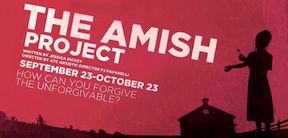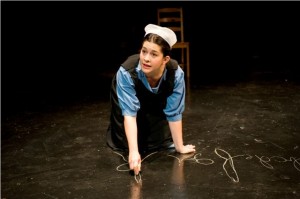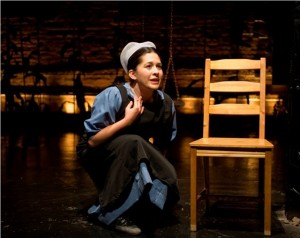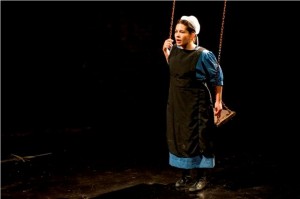FORGIVE AND FORGET
The Amish people of Nickel Mines, Pennsylvania, taught the world a sobering lesson in 2006 when they instantly forgave the man who murdered five girls in their one-room schoolhouse. They offered condolences to – and even shared donations meant for the victims’ families – with the murderer’s widow. Here was a man who bound children with plastic ties and planned on sexually molesting them. When police arrived on the scene; he shot ten girls at point blank range before turning the gun on himself.
What kind of community forgives instead of resorting to a knee-jerk reaction of blind revenge? What do these people do to mourn and work through such an unspeakable crime? Unfortunately, we will not find a deeper understanding of this event and its aftermath in American Theater Company’s The Amish Project, a debut play by Jessica Dickey. Perhaps director PJ Paparelli found the subject matter so gripping that he mistook confusing dramatic structure for compelling playwriting.
In this seventy-minute one-person play, Sadieh Rifai plays several fictionalized community members, including the gunman and his widow, a scholar, a Puerto Rican teenage girl, and, most successfully, one of the young victims of the shooting. But Ms. Rifai is limited by the repetitive, meandering, somnambulistic construction of the piece: characters come and go with such rapidity, often with just one line, that it is difficult to figure out where the playwright is taking us. We want Ms. Dickey to dig deeper into the psyche behind this uniquely American occurrence. Plus, there needs to be a clear protagonist leading us on this journey – a journey which clearly wishes to be like The Laramie Project, Moises Kaufman’s insightful piece which used actual interviews of the people associated with the tragedy involving Matthew Shepard.
The young schoolgirl who begins the imagined account of this true story does indeed hint at the character of the Amish (she tells us her dream of a non-Amish boy’s decision to become a member of her faith in order to marry her), but we have no idea who she (or anyone else in the play) is talking to. A reporter? A visitor? A pastor? An audience in a theater? Because we have no context, it is impossible to become emotionally involved.
Ms. Rifai is also limited by the decision to not have her characters created with distinction – there are times when it seemed like some neighbor was speaking to us when it turned out to be someone else. Clad in an Amish dress the entire time, Rifai rarely differentiates the seven personalities she portrays with distinct physical manifestations. (Fortunately, Jesse Klug’s lighting design was a character unto itself, shifting in fascinating geometric shapes with each change of character.) Rifai’s dialects were inconsistent, although the Puerto Rican girl was replete with diphthongs and lip-smacking that often appeared authentic.
William Boles’ set is lovely, with pieces that represent the Amish community: cornstalks, rafters and a country swing; yet, as with the characters in the play, the set only hinted at the Amish community at large. Paparelli makes good use of the space, utilizing stairways and the lobby of the theater, from which emanates an eerie shaft of light that floods Rifai like a film noir thriller.
The theater world has seen an upsurge of one-hour one-person shows that seem to serve no other purpose but to showcase an actor at a reasonable production cost. No doubt the intentions here were honorable, but if nothing else, I learned a lesson at ATC: no matter how inundating the plethora of one-person shows may be, I can still find room in his heart to forgive yet another such would-be tour-de-force, hoping that through this forgiveness, the theater world will challenge itself to rise above this increasingly numbing art form.
photos by Michael Brosilow
The Amish Project
American Theater Company (ATC)
1909 W. Byron Street
Thurs and Fri at 8; Sat at 2 & 8; Sun at 2
ends on October 23, 2011
[on March 4, 2018, American Theater Company
ceased operations; more on this story at Chicago Tribune]




